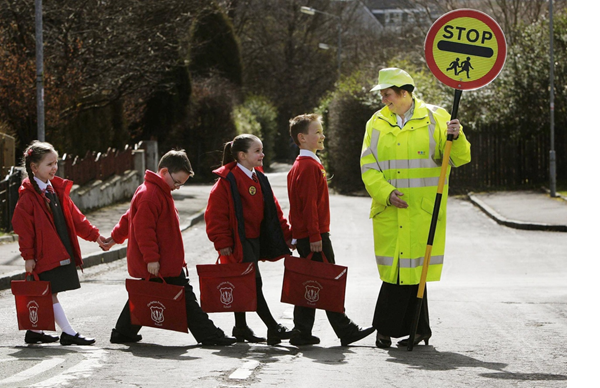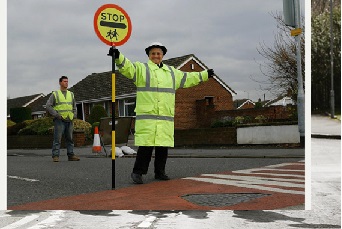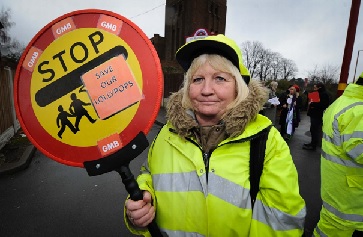Lollypop Lady/Man
Concept Investigation
by: Gyul Idris
The Lollipopper, also known as a lollipop lady or lollipop man, and officially referred to as a “school crossing patrol officer”, is one of the unsung heroes of the school run. Standing in high-visibility clothing on crossings near schools, he or she will periodically stop traffic in order to let children safely cross the street.

Below I will give a list of the different definitions that the dictionaries give:
Cambridge Dictionary:
lollipop man/ladynoun [ C ]
UK /ˈlɒl.i.pɒp ˌmæn/ US /ˈlɑː.li.pɑːp ˌmæn/ uk informal-a person who helps children to cross the road near a school bystanding in the middle of the road and holding up a stick with a sign on it that means that the traffic must stop.
Oxford Dictionary:
lollipop lady (also lollipop woman)
noun British informal
- a woman who is employed to help children cross the road safely near a school by holding up a circular sign on a pole to stop the traffic.
Urban Dictionary:
Lollipop lady
A crossing guard, holding a big "stop" sign resembling a lollipop.
We can't cross the road until the lollipop lady says it's ok.
The Free Dictionary:
lollipop man or lollipop lady n
(Professions) (in Britain) a person who stops traffic by holding up a circular sign on a pole to allow children to cross aroad safely. Official name: school crossing patrol
Lollipop men and women first appeared in London in 1953.

The round lollipop was introduced in the 1960s. In 1974 the uniform changed to the familiar yellow coat.
In Australia and the United Kingdom, a school crossing supervisor or school crossing patrol officer is commonly known as a lollipop man or lollipop lady, because of the modified circular stop sign he or she carries, which resembles a large lollipop. The term was coined in the 1960s when road safety awareness programs were rolled out in schools throughout the UK and the crossing patrols were introduced by the Road Traffic Regulation Act 1967.
Under UK law it is an offence for a motorist not to stop if signalled to do so by a patroller. In the past patrollers only had the authority to stop the traffic for children. However, the Transport Act 2000 changed the law so that a patroller had the authority to stop the traffic for any pedestrian. Following UK legislation in 2000 stating that lollipoppers were no longer a legal requirement for schools, an increasing number of crossing guards have been taken off the road. Due to an increase in abuse, threats and other aggressive behaviour from some drivers, signs with built-in hi-tech cameras are being introduced to record offenders, cars and registrations.

In the USA in the early 1920s in response to the growing number of children meeting grisly ends on the way to school, several small towns began experimenting with crossing patrols. Eventually the idea found its way to Britain and in 1937, one Ms Hunt was appointed as the first ever ‘lollipop lady’ by Bath City Corporation. The concept was enshrined in law in 1953, around the time when school crossing patrols rolled out across the country.
‘The Telegraph’ has published the topic ‘Lollipop men and women: a history’ on 7th March 2011. It is about a woman named Eunice Robinson who celebrated 40 years of work on a single patrol in 2002- Britain’s longest-serving lollipop lady.
BBC News has published the topic ‘Meet the 17-year-old lollipop lady’ on 14th July 2013. It is about the youngest school crossing wardens who are only 17 years old and want to work with children.
BBC News has published the topic ‘Lollipop lady ‘banned’ from high-fiving school pupils’ on 14th December 2016. It is about a crossing assistant who has been asked to stop earlier that week because of the students wish. The same news has been published by ‘Wales Online’ with the topic’ Parents are angry after this lollipop lady was told to stop high-fiving school children’ later on 14th December 2016 and by ‘The Telegraph’ on 15th December 2016 with the topic ‘Outcry as school lollipop lady banned from 'high-fiving' children’.
There is a topic ‘Hero Lollipop Lady’ in the ‘Mirror’ which is about a lady who has saved children’s in the time of a car accident.
29th November is the National Lollipopper Day. This might sound like a celebration of confectionery, but the ‘Lollipopper’ is in fact a small, vital part of the national infrastructure.
There are many poems about lollypop ladies. I will introduce the one I liked the most:
The Lollipop Lady
She stands on the pavement, the same time every day
Morning and afternoon, she helps the children on their way
She polices the traffic, with her lollipop stick
Holding up the cars, that might be moving very quick
The kids all see her every day, and smile as they arrive
Her job, to keep them safe, and ensure that they stay alive
A sort of saintly goddess, armed with just a pole
Helping kids across the road, she is a kindly soul
Phil Soar
Metaphors are used in the text such as lollipop stick, saintly goddess, kindly soul, polices the traffic. There are hyperboles such as holding up the cars, moving very quick and polices the traffic.
There are also song about lollypop ladies usually sang by children.
Unfortunately, in Bulgaria we do not have Lollipop ladies/men. I think it should be secure for children and parents will be sure that their children are save.
